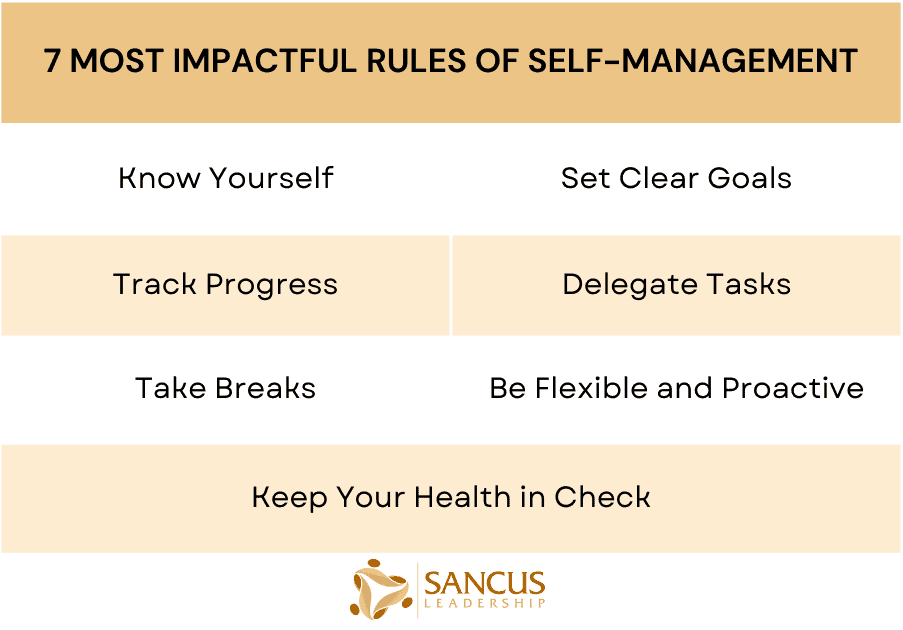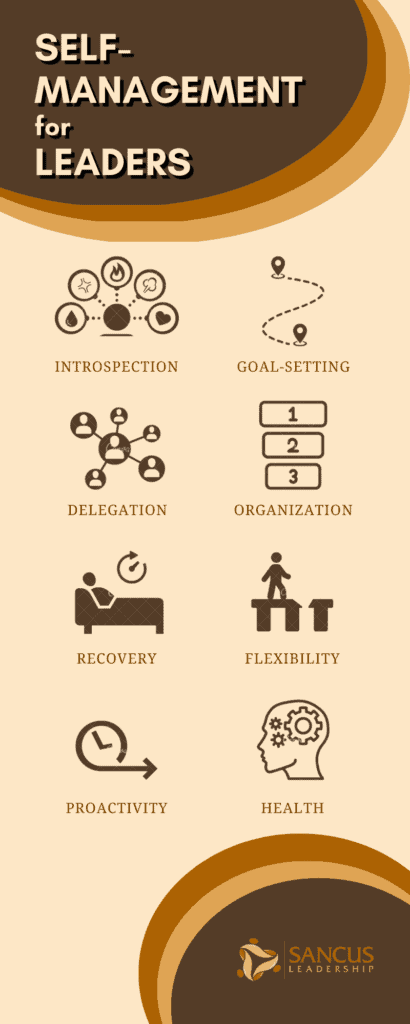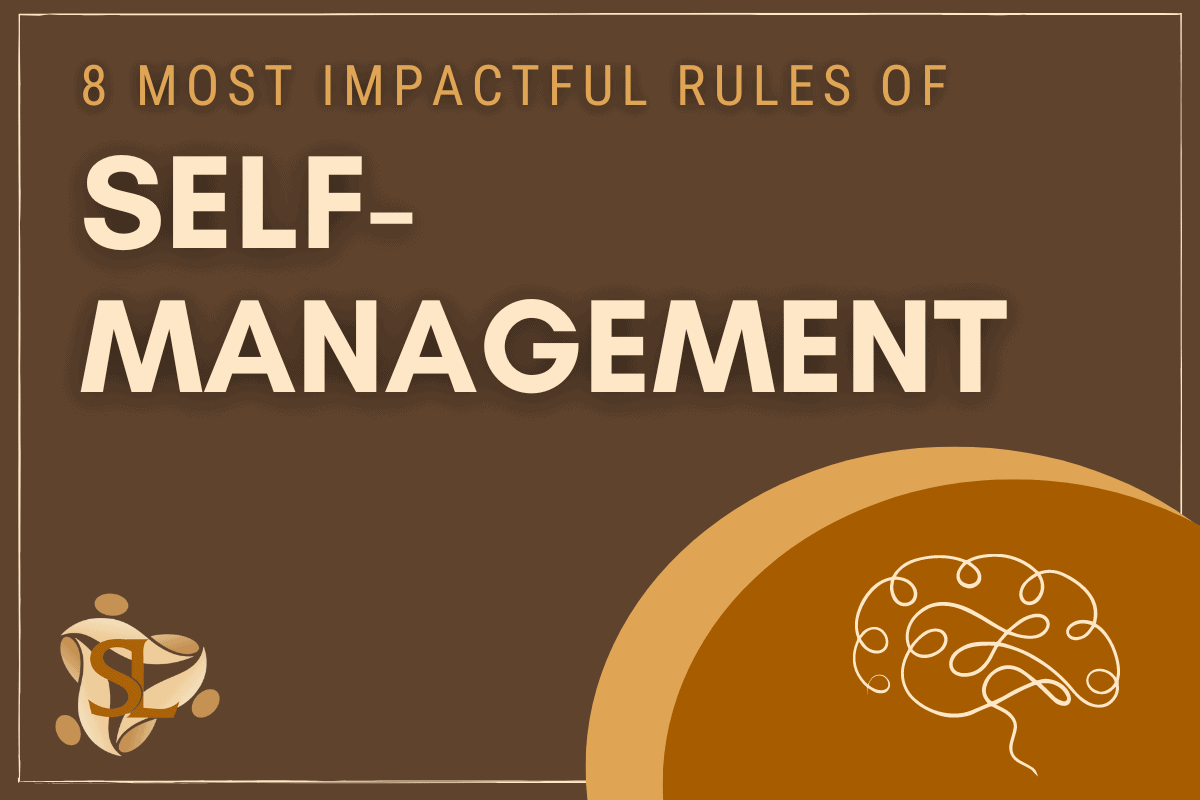Are you a leader or aspiring to be one? Do you want to build an effective small business team? If so, then self-management is vital.
All leaders should follow the seven fundamental rules of self-management: know yourself, set clear goals, delegate tasks, stay organized, take breaks, be flexible, be proactive, and keep your mental health in check.

Self-management is usually defined in two separate ways: it can be used to describe how we manage the external world around us, or it can be used to describe how we manage our internal thoughts and emotions.
In this article we will focus on self managing the external world but if you want to learn more about how to manage your emotions, click here!
Keep reading to learn more about these essential self-management tips for leaders!
1. Know Yourself
Identify Your External Motivators and Stressors

Knowing yourself is crucial to self-management. It involves being aware of what brings you joy, what motivates you to work hard, and what drains your energy.
For example, taking a regular break from work or rewarding yourself with small treats after meeting small goals can help keep you focused and motivated. In tandem, avoiding specific pressures or tasks that cause stress should reduce feelings of overwhelm.

I usually work according to something I call the “30 + 10”. This means I will work entirely focused for 30 minutes. Then I will do something I enjoy for 10 minutes; usually, the treat is watching a youtube video or going for a walk. The key is that it needs to be something you truly like, not something that someone else thinks is good for you.
It might seem strange to “waste” so much time out of the hour, but I have noticed that my production goes up because those 30 minutes are high quality.
Knowing yourself is crucial to successful self-management; once you understand which stimuli have the most favorable outcome, it’s easier to create routines and habits that put your mind at ease and increase productivity.
Once you understand which stimuli have the most favorable outcome, it’s easier to create routines and habits that increase productivity.
The key to this is to remember that team members are different, and not everyone will be motivated by the same things; recognizing what drives them forward can help create a clear vision that sets you and your team up for success. For more information about identify your team members’ unique motivators, click here!
2. Set Clear Goals
Stay Organized
Goals allow individuals and their team members to stay focused and motivated. People often need a specific and achievable target to progress with their projects or tasks.
The benefits of having predetermined objectives are:
- Numerous tasks can be planned more effectively.
- There will be a greater sense of accomplishment when individual and team goals have been met.
- Progress can be easily tracked as you take your project from inception to completion.
The absolute most important factor when trying to become more effective is to figure out what is the most impactful thing I need to do. Specifically: which 5% of my total tasks add up to 80% of my actual progress? This is the key to prioritizing goals so energy is used efficiently and effectively.
Which 5% of my total tasks amount to 80% of my actual progress?
Once you understand your high-value targets, you start hunting them like a lion after its prey.

Leading by example is a great way to manage expectations. When a leader is organized, prioritizes tasks, and tracks their progress, fellow team members will soon see the benefit and follow along.
3. Track Progress
Identify Targets and Milestones
Staying organized and keeping track of progress are essential tools to have in any self-management strategy. It is easy to become overwhelmed and reach one’s limits if not managed correctly in daily life and tasks. Therefore, having a plan and tracking progress can help you manage stress, boost your motivation, keep you prepared for changes, and allow you to reach goals with less effort.
Additionally, identifying broader goals and then breaking them down into key milestones can energize your team members. You will have smaller wins to celebrate on your way to achieving the overarching objectives of a project.
As mentioned before, these milestones should be prioritized based on your most important goals. But they should also be identified based on your and your team members’ motivations. Identifying the small wins that truly matter to yourself and your team members is key to fostering self-efficacy and passion.
4. Delegate Tasks
Provide Clear Instructions
Successful leaders need to understand that they cannot do everything by themselves. Therefore, the delegation of tasks is crucial to maintain efficiency and progress.
It is necessary to provide clear instructions when assigning tasks to ensure they are adequately accomplished. For example, it can be helpful to clarify precisely which resources can be used, how each task should take shape, and what the outcome should look like.
However, stay away from telling your people how to do things. Instead, focus on the what and when.

Taking the time to ensure your goals are properly understood can save considerable time in the long run. But on the other hand, individuals feel included when they are trusted with tasks.
A great tip to make sure they have understood the task is for your employees to repeat back to you what you have said in their own words. Remember to ask them if they have any questions.
Stay away from telling your people how to do things. Focus on the what and when.
Once you are confident that they understand, then you start asking them questions about the task. Once you have finished these three steps, you can be pretty certain that your team has understood what you want to get done.
5. Encourage Recovery
Preemptively – Not After Burnout

It’s easy to become overwhelmed with constantly being on the go, but taking the time to step away and relax will produce massive benefits.
As I mentioned above, doing something refreshing, like going for a walk or taking a coffee break, can be incredibly helpful in allowing us to step back and reevaluate our short-term and long-term goals. In addition, taking breaks helps ease stress while allowing us the opportunity to refocus our energy on achieving essential objectives.
I probably don’t have to mention that there are basically a gazillion health benefits as well.
Learning to recover when needed is an integral part of any self-management plan!
In the military, we say recovery is a task! This means recovery should be planned, prioritized, and allocated resources, just like any other assignment.
Recover should be planned, prioritized, and allocated resources.
6. Be Flexible and Proactive
Plans Change
It’s essential to recognize that plans ALWAYS change, sometimes just a little, but often significantly. You have probably heard the old saying the plan only survives until the first contact with the enemy. This is true in war as it is in business.
A plan is nothing, planning is everything.
It’s important to be agile enough to accept and work with the changes instead of being set on a course and inflexible when things change.

This can be especially difficult when trying to complete tasks or achieve goals, but taking unexpected changes into account and adjusting accordingly will result in a much more successful project overall.
A really good leader will have anticipated most of the changes and will have put contingency plans in place beforehand.
Learning to be proactive instead of reactive is crucial to managing a team and setting an example. Thinking ahead and planning for potential problems can prevent them from happening. Even if they do occur, you will be better prepared than if you had done nothing to anticipate them.
It is also essential to keep in mind that being proactive means taking steps that could reduce the severity of any problem encountered and may even help improve future processes or projects.
If you want to learn more about leadership in crisis, this article might interest you: Leadership in Crisis, Who Do You Need to Become?
Acting proactively does not mean predicting the future with absolute accuracy but rather having a flexible contingency plan to deal with highly likely scenarios efficiently, allowing the business to get back on track as quickly as possible.
8. Optimize Your Health
Mental and Physical

We often find ourselves so consumed with pursuing success that we forget to take care of our health. We must remember that managing our stress levels and getting sufficient recovery is the basis of performance.
Taking the occasional break can be beneficial, as it will allow us to come back to work with a fresh perspective and perhaps new ideas. So even when life feels busy, set aside time every day to wind down and get eight hours of sleep—trust me, your future self will thank you.
The best leaders are physically fit, mentally fit and take care of themselves in a way that optimizes performance.
Do your strength training, go out running, train your mental capacity, and get mentally tough because life is coming right at us!



